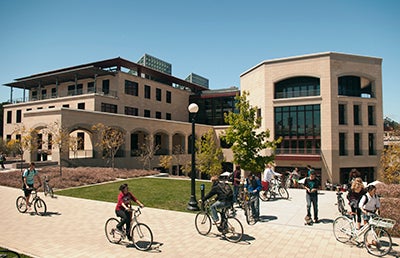Engineering coterm students gain skills and experience
About 40 percent of the school’s undergraduates become coterms (formally known as coterminal students), leveraging their time at Stanford to add a master’s degree to their credentials.
By Andrew Myers
Today Justin Rosenstein is the co-founder of startup Asana and former engineering technical lead at Facebook. But only a few years ago he was an engineering student in Stanford’s coterm program, which allows students to pursue master’s degrees while still undergraduates.
“I was really grateful for the opportunity to seamlessly transition from undergrad into doing more advanced research,” said Rosenstein, whose company created a popular web-based productivity tool. “In particular, being able to go deep on my primary love – computer science – while continuing to take classes in my other areas of interest, including psychology and poetry, was a really special opportunity.”
Rosenstein isn’t alone. About 40 percent of School of Engineering undergraduates opt to pursue a coterminal master’s degree, according to recent data. Many do so for the reasons he cites – the opportunity to expand study of their majors and of classes outside their majors. For others, the primary reason is professional: An engineering master’s degree is highly valued in the marketplace.
“The coterm program brings a talented and diverse set of undergrads into our master’s program. They strengthen our student population – and faculty love them,” said Brad Osgood, a professor of electrical engineering and associate dean for student affairs in the School of Engineering.
Before he co-founded Instagram – the enormously popular photo-sharing app purchased by Facebook – Mike Krieger was a coterm student at Stanford. He earned his master’s and bachelor’s degrees in symbolic systems, an interdisciplinary field that blends cognitive sciences such as linguistics and psychology with technical fields such as artificial intelligence to explore how people and computers communicate through symbols.
In practical terms, Krieger credits the coterm for a direct impact on his success at Instagram. “While the undergrad degree offered broad perspective with a bit of everything, the coterm provided focus and depth. I learned how humans form networks and share information, both of which were valuable in the formulation of Instagram. Plus, I got to publish two papers, which I’m still proud of today.”
See the entire story on the School of Engineering website.

